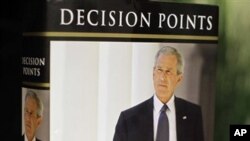Former U.S. President George W. Bush says Egyptian President Hosni Mubarak informed the U.S. that Iraq had weapons of mass destruction. He also spoke of other people who had influence on his decision to invade Iraq.
The revelation comes in Bush's memoirs, Decision Points, in which he highlighted mistakes made during the Iraq war campaign, and the failure to find weapons of mass destruction in the country.
"President Hosni Mubarak of Egypt had told [general] Tommy Franks that Iraq had biological weapons and was certain to use them on our troops," Bush revealed in his newly-released book.
The former president said Mubarak "refused to make the allegation in public for fear of inciting the Arab street."
So far, the Egyptian government has issued no reaction to Bush's claim.
Bush explained that the "intelligence from a Middle Eastern leader who knew [former Iraqi president] Saddam [Hussein] well had an impact on my thinking."
"Just as there were risks to actions, there were risks to inaction as well," he wrote in Decision Points.
Bush says the diplomatic process drifted along, the pressure for action had been mounting. He says in early 2003, Federal Reserve Chairman Alan Greenspan told him the uncertainty was hurting the economy. There was also concern among America's Middle East allies.
"Prince Bandar of Saudi Arabia, the kingdom’s longtime ambassador to Washington and a friend of mine since dad’s presidency, came to the Oval Office and told me our allies in the Middle East wanted a decision," Bush explained.
Another person who had a deep impact on his war decision was holocaust survivor and Nobel Peace Prize recipient, Elie Wiesel.
"There was passion in his 74-year-old eyes when he compared Saddam Hussein's brutality to the Nazi genocide," the former president remembered.
"Mr. President," Wiesel said, "You have a moral obligation to act against evil," Bush wrote.
He also wrote about his reaction when WMDs were not found.
"No one was more shocked or angry than I was when we didn't find the weapons [of mass destruction]. I had a sickening feeling every time I thought about it. I still do," Bush said.
The former chief of state admits the fight in Iraq was more difficult than expected, but he believes the consequence of the American occupation was a chance for democracy to take root on the Persian Gulf.
In his book, Bush revisits other controversial war decisions and defends them vigorously. He says the war on Afghanistan [launched in October 2001 following the September 11, 2001 terrorist attacks in America) was necessary to uproot al-Qaida and the Taliban.
Bush wrote: "History can debate the decisions I made, the policies I chose, and the tools I left behind. But there can be no debate about one fact: After the nightmare of September 11, America went seven and a half years without another successful terrorist attack on our soil. If I had to summarize my most meaningful accomplishment as president in one sentence, that would be it."
The former president closes his memoirs by saying he's comfortable knowing that history's verdict on his presidency will come after he's gone.
"Whatever the verdict on my presidency, I’m comfortable with the fact that I won’t be around to hear it. That’s a decision point only history will reach," Bush wrote.
Decision Points was released in bookstores on November 9.






